Our Impact
PADet has reached a total of 5.2+ million beneficiaries for the last 23 years and reached the following program milestones:
Food security and livelihoods of vulnerable youths, women and people with disabilities have improved:
PADet implements projects that contribute to food security and building resilience of food insecure vulnerable groups and households by adopting integrated approaches which include interventions such as community based integrated watershed development initiatives, supporting development of potable water supply, supporting the promotion of basic education, introducing improved seed, building small-scale irrigation; promotion of disaster risk reduction interventions via school and community based structures.
Moreover, PADet promotes rural youth employment and provides livelihood support for creation of youth employment opportunities. PADet has gained a good deal of experience and learning to adapt and replicate the livelihood intervention model or its components to design new projects and share the learning among its networks and partners. Among these initiatives, ‘Youth in Action’, ‘Building the Potential of Youth’, ‘Youths Employment Enterprise’ and ‘Poverty Reduced Sustainably in an Environment of Resilient and Vibrant Economy [PReSERVE]’ projects are the major ones.
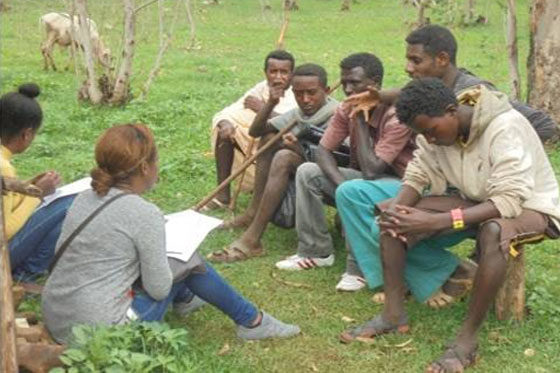
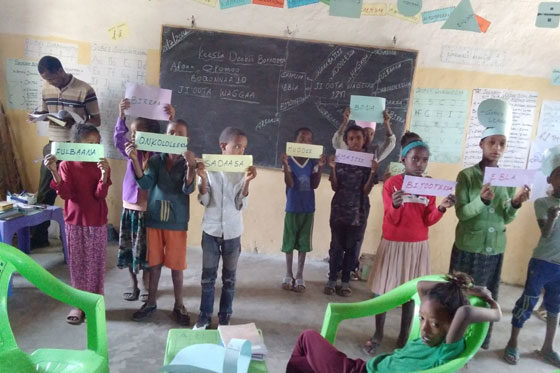
Protection and development for children promoted:
PADet is working in the prevention of child trafficking, tracking safe movements of children and supporting the reunification of migrant children, and supporting vulnerable children using a coalition of care/ community child protection structures. We have also been active in preventing HTPs such as early marriage and child labour at targeted areas. We implemented child protection guidelines and encouraged project staff to do so.
Moreover, PADet has also ample experiences in conducting an accelerated learning program for out of school children aged 10-14, improving quality of education at pre-primary, primary and secondary school level, supporting children, guardians and parents with viable income generation and savings promotion activities, promoting savings and village loans and creating a safe environment for children. PADet has also been implementing a project aimed at creating a safe and supportive environment for Ethiopian Child Domestic Workers [CDWs] and by working closely with relevant stakeholders, protect them from any form of abuse or harm.
The program also focused on ensuring quality service delivery through implementing social accountability tools.
Sexual reproductive health and rights of adolescent girls, women and people with disabilities have promoted::
PADet is committed to promoting girls’ education integrated with adolescent reproductive health and HIV/AIDS prevention and control. The objective is to improve adolescent reproductive health services in schools, teaching them life skills that integrate with the promotion of income-generating activities for parents and guardians of children from low-income families which aim to improve the enrolment rate of girls, increase the self-confidence of adolescent girls, and create an environment conducive to children, adolescents and young people [CAY], addressing deep rooted societal norms and HTPs such as child marriage, teenage pregnancy and child labor exploitations, etc. The sexual reproductive health program also includes programs such as conducting champions of change [COC] sessions, peer-to-peer approach and youth-led media engagement to equip adolescents and youths with knowledge and skills on SRHR, capacitating in and out of school adolescent and youth clubs and platforms to support awareness and advocacy work on sexual reproductive health and rights [SRHR], menstrual hygiene management [MHM], climate change resilience and youth economic empowerment, strengthen the capacity of children, adolescents and youths [CAY], etc. .
In addition, PADet has worked to reduce maternal morbidity and mortality by reducing the incidence of unplanned pregnancies and unsafe abortions. We have embarked on strengthening sexual reproductive health information and services through community outreach activities and strengthening referral linkages such as conducting youth and community dialogues, conducting social events, SRH education through in-market mini-media events, conducting home-to home visits/couples counseling, distributing IEC/BCC materials, etc.
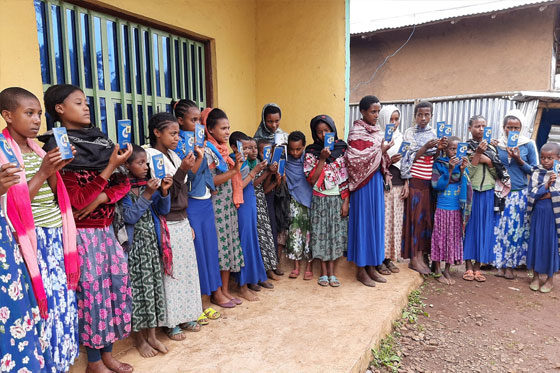
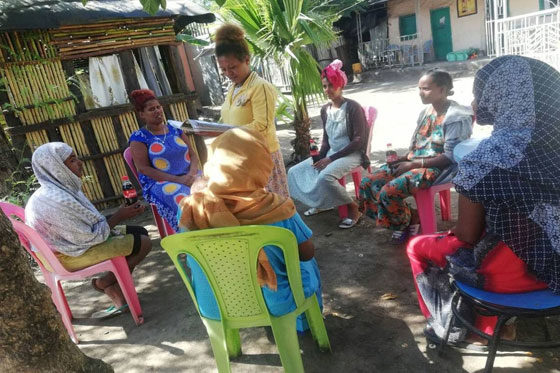
HIV/AIDS prevention, care and support have provided to Key and Priority Populations:
PADet has successfully implemented HIV prevention among MARPs funded by USAID via FHI 360-HIV prevention among at risk mobile population, urban HIV/AIDS nutritional support project for HIV/AIDS affected and infected HHs by USAID via SCI, OVC and mothers under PMTCT service [WFP], urban gardens promotion for HIV affected HHs and OVC by USAID via DAI [Dev.t Alternative Inc], HIV/AIDS prevention-part of the national new partners initiative program [NPI] by USAID fund via Geneva Global Inc, integrated child development program HIV/AIDS prevention component by SC-Denmark, MULU MARPs HIV/AIDS prevention and community HIV treatment and care project [CHCT] in different Woredas and towns and reduce the impact of HIV/AIDS among female sex workers in three towns of North Wollo Zone [Mersa, Woldia and Kobo Towns] in partnership with CCRDA/Global fund.
Besides, PADet is currently implementing HIV prevention, testing and treatment services for Key and Priority Populations [KPs] in 14 Woredas of North Wollo Zone and is contributing its own role in HIV prevention, treatment and care and support. In addition, the HIV Prevention, Testing and Treatment Services for Key Populations project focuses on increasing the availability of high-quality HIV prevention services and improving case identification through implementing targeted testing strategies including index case testing [ICT], HIV self test [HIVST] and reaching sexual networks for key and priority populations. In connection to this, increasing access to ART and improved coverage through the provision of differentiated care models including treatment in drop-in centers for key and priority populations is the basic objective. It also aims to reduce Lost to Follow Ups [LTFUs] through improved linkage, adherence, and retention interventions including same-day ART and reducing HIV/STI co-infection through increased utilization of SRH/GBV services integrated with HIV services by key and priority populations.
PADet has extensive experience in the implementation of HIV programmes in different districts of Amhara and Oromia Regional States in four key outcome areas; providing targeted testing and integrated referral service, strengthening community-based HIV/AIDS case management, improving adherence counseling and building the capacity of local organization so as to achieve 95-95-95 goals.
Gender equality is promoted and women are empowered:
PADet, in close collaboration with grass root level women structures and relevant government stakeholders, is promoting gender equality and reducing violence against women and girls through different capacity development activities such as economic empowerment of girls and women and applying gender transformative approaches. PADet also works to increase the participation of women and girls and their organizations in the country’s development and democratization process and thus to the achievement of the UN sustainable development goal five in Ethiopia.
To achieve sustainable development, PADet has made empowering women and girls one of its fundamental strategies, which includes:
- Building women and girls life skills, confidence and motivation to ensure assertiveness: Women and girls empowered with holistic training and capacity building programs designed to enhance their skills, knowledge and confidence on equity, equal opportunity and human rights.
- Strengthening women economic opportunity to improve their livelihood: As the economic dependence of women on men contributes to gender inequality, PADet provided support for women to improve their livelihood. Particularly, women are supported to establish/strengthen saving and credit schemes and provided with material support.
- Influencing social norms, values and beliefs for community engagement against VAWG and meaningful women participation: Misconceptions and negative attitudes on gender is a key barrier for equal opportunity and human rights. The organization also enhances the role of boys and men as champions against Violence Against Women and Girls [VAWG] and discrimination. PADet capacitated a school media programs and linked with girls’ clubs to disseminate information and education on equal opportunity for schooling and participation for boys and girls, on abuses and HTPs such as early marriage and FGMs.
- Advocating for women’s equal rights and opportunities, acknowledgment of Unpaid Care Work (UCW) and elimination of VAWG: PADet promotes and advocates to fill the gaps related to legal issues. Existing policies and legal frameworks, regional and global agreements signed by the country are examined to identify gaps, inconsistencies and areas for improvement.
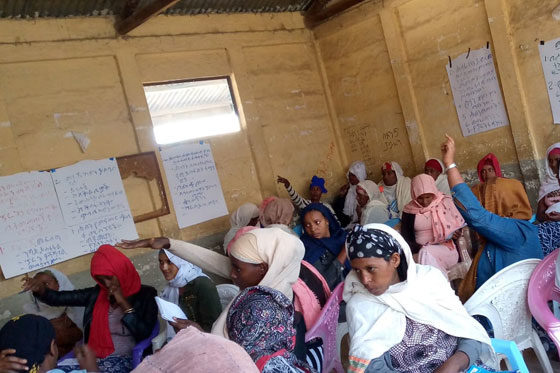
Sustainability and Scale-ability:
PADets makes sure that its projects are sustainable and scalable – sustainable in the sense that the beneficiaries and local development actors will not only retain their gains, but also add value on to them, enabling the monuments of the project to stay alive long after it has phased out; and, scalable in the sense that other communities elsewhere could replicate the strategy PADet has used by contextualizing them. We do this by:
- Securing the ownership and commitment of the community/stakeholders from the initial stage of projects and throughout the implementation process.
- Enhancing communities and government sector offices’ participation through securing from them matching inputs (money, knowledge, expertise, etc), and urging beneficiaries to manage schemes (small irrigation schemes, water points, recreation centers.)
- Securing the involvement of community and stakeholders’ representatives in institutions or structures (task-force, committees, etc) created, and empowering them to forge workable bonds among them so that they lead and manage projects on their own.
- Building the Capacity of Partners through training, technical and material support.